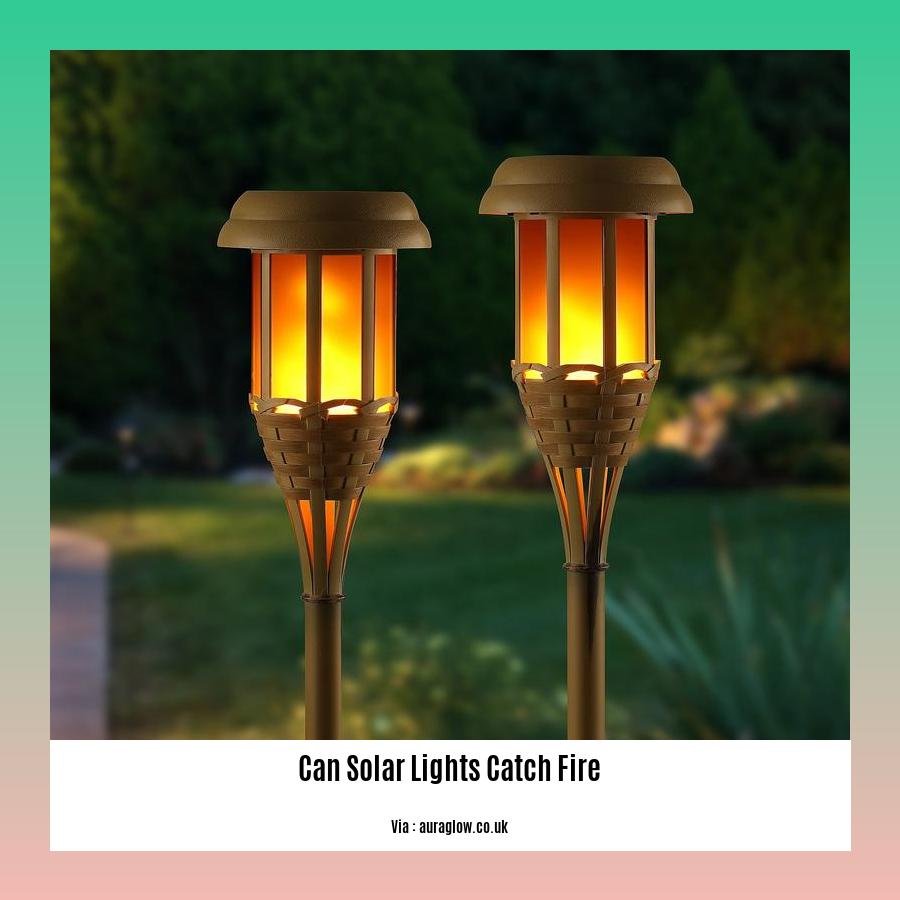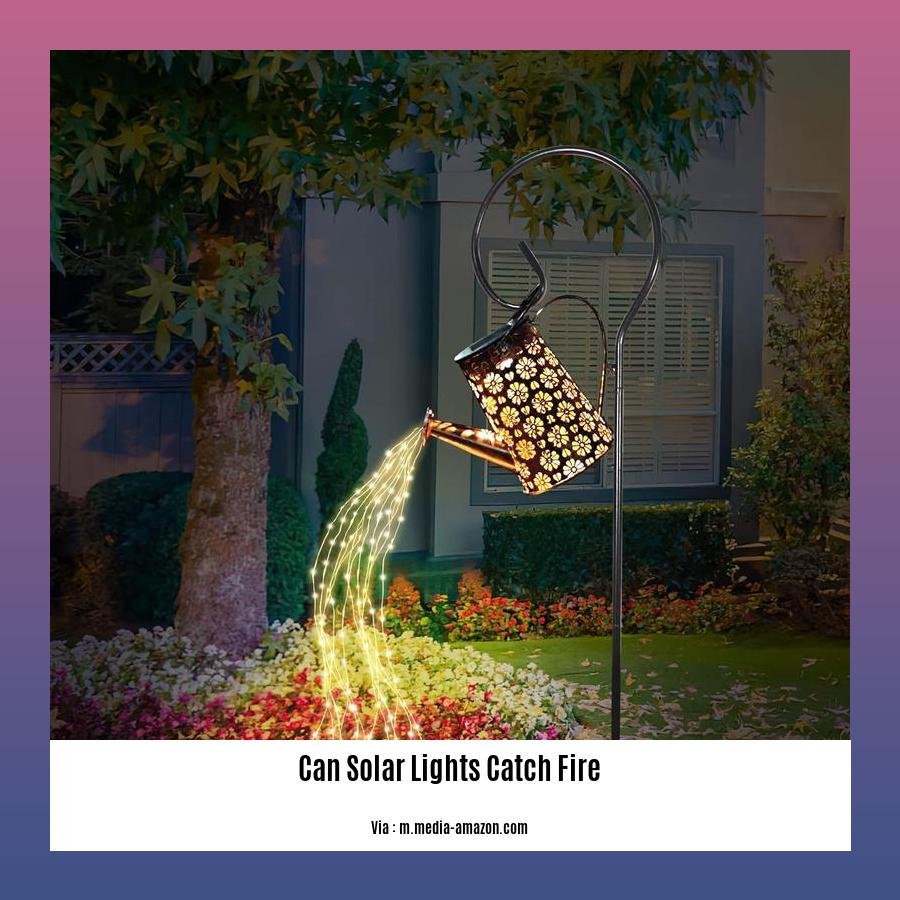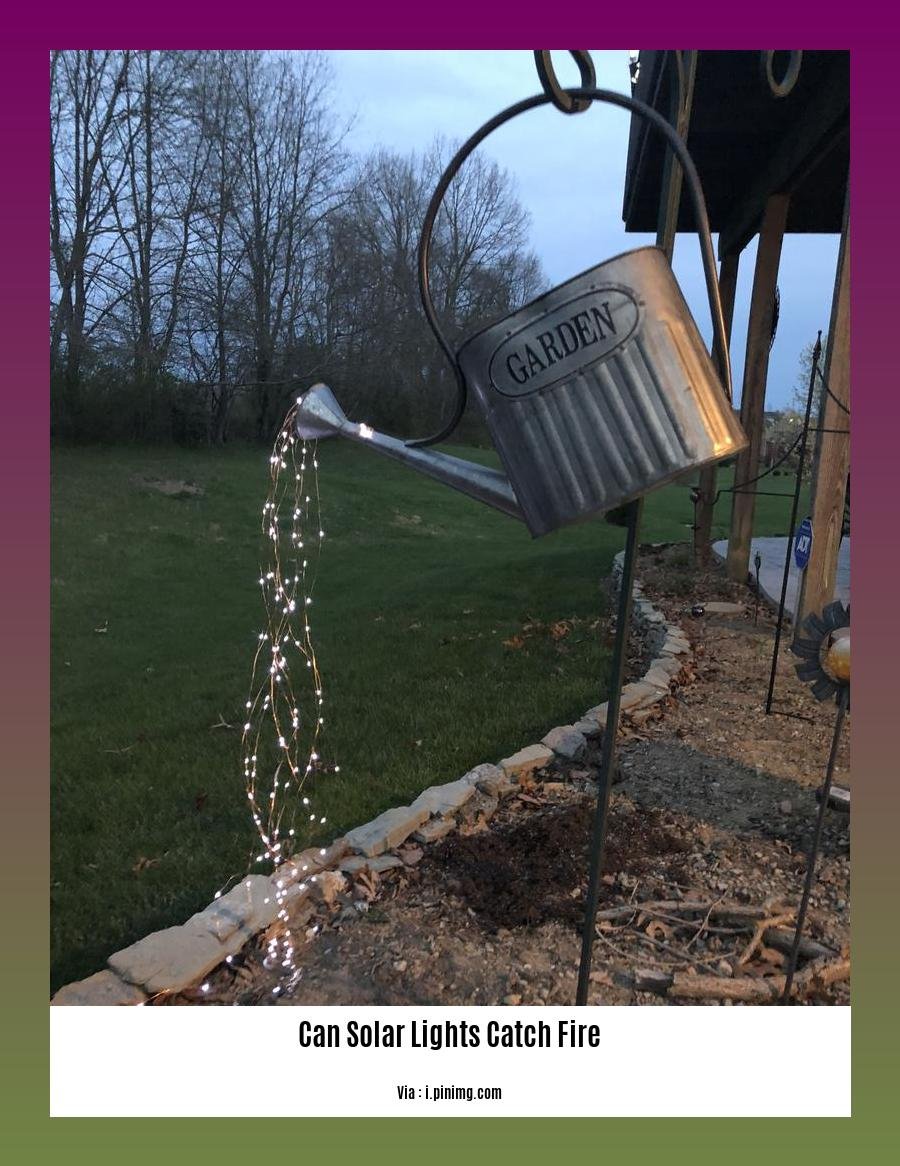– Can Solar Lights Catch Fire: Risks, Prevention, and Safe Usage – Solar lights, a popular choice for outdoor illumination due to their energy-saving and eco-friendly nature, have raised concerns regarding their potential fire hazards. While rare, incidents of solar lights catching fire have been reported. This article delves into the risks associated with solar lights, exploring the causes behind these fires and providing practical steps to prevent them, ensuring the safe use of solar lights.
Key Takeaways:
Can Solar Lights Catch Fire?

Yes, can solar lights catch fire, although it’s pretty unusual. However, there are some risks to be aware of when using them. Make sure they meet safety requirements and are installed correctly.
What Causes Solar Lights to Catch Fire?
- Overheating: When solar lights are exposed to direct sunlight for an extended period, the battery can overheat and catch fire.
- Defective Batteries: Cheap, poorly constructed batteries are more prone to overheating than reputable brands.
- Damaged Wiring: If the wiring is damaged, it can cause a short circuit and fire.
- Improper Installation: If solar lights are not installed correctly, the panels may not be angled correctly to receive adequate sunlight. This can cause the battery to overheat and ignite.
How to Prevent Solar Lights from Catching Fire:
- Choose Lights with Safety Features: Before buying, research and look for solar lights with built-in safety features like thermal cut-offs and overcharge protection.
- Proper Installation: Place solar lights in a location directly exposed to sunlight, ensuring the wiring is secure, avoiding areas where they might overheat.
- Check Regularly: Regularly inspect solar lights for signs of damage to the wiring or panels. Timely repair or replacement is important.
- Remove Debris: Keep solar panels clean and free of debris to prevent overheating.
- Follow Manufacturer’s Guidelines: Always follow the manufacturer’s instructions for installation and use.
What to Do If a Solar Light Catches Fire:
- Stay Calm: Fire spreads fast, so staying calm is crucial.
- Extinguish the Fire: If possible, use a fire extinguisher or a bucket of water to douse the fire.
- Call the Fire Department: If unable to extinguish the fire or if it’s spreading beyond control, call the fire department immediately.
- Dispose of the Light Properly: Once the fire is out, dispose of the solar light properly according to local regulations.
Conclusion
While the chances of a solar light catching fire are low with proper precautions, they can be minimized. Safety should always be a top priority, and taking the necessary steps can ensure a safe and enjoyable experience with solar lights.
-
Explore the comprehensive list of approved homeopathic medicines at bm homeopathic medicine list that can address your health concerns.
-
Discover the extensive compilation of homeopathic medicines in Urdu at bm homeopathic medicine list in urdu and enhance your well-being.
-
Check out the budget-friendly bm homeopathic medicine price list to find affordable solutions for your health needs.
-
Browse the exhaustive bm homeopathic product list to explore a wide range of homeopathic remedies and remedies for various ailments.
-
Personalize your home with distinctive brass name plates for home that add elegance and charm to your living space.
-
Learn how homeopathy can help manage constipation long-term. Read about its possibilities in can homeopathy cure constipation permanently.
How to use solar lights safely to minimize the risk of fire
Hey folks! Today, we’ll dive into the world of solar lights. These handy gadgets harness the sun’s rays to brighten our nights, all while being easy on the wallet and the environment. But, just like any electrical device, there’s a potential risk of fire if we don’t use them safely. Let’s uncover some key takeaways to ensure our solar lights shine brightly and safely.
Key Takeaways:
-
Installation matters: Choose a spot away from flammable materials, like overhanging branches or dry grass, and ensure the lights receive ample sunlight throughout the day.
-
Battery safety: Opt for high-quality batteries designed for solar lights. Avoid mixing old and new batteries, and never charge them indoors or leave them in extreme temperatures. Replace batteries regularly to prevent leakage and potential fire hazards.
-
Wiring woes: Inspect the wires regularly for any damage or fraying. Ensure proper insulation and avoid overloading circuits. If in doubt, call in a professional electrician for help.
-
Maintenance matters: Keep your solar lights clean by wiping off dust and debris. This prevents overheating and ensures optimal performance. During the off-season, store your lights in a cool, dry place to prolong their lifespan.
-
Emergencies happen: Keep a fire extinguisher nearby in case of emergencies. If you notice smoke or a burning smell coming from your solar lights, immediately turn them off and disconnect the power source.
By following these simple precautions, you can enjoy the benefits of solar lights without compromising safety. Remember, a little care and attention go a long way in preventing accidents and keeping your home safe.
[Sources:]
– Do Solar Lights Cause Fires? | Solar Light Safety
– Solar Lights and Fire Safety
What to do if a Solar Light Does Catch Fire

Solar lights are an eco-friendly and cost-effective way to illuminate your outdoor space. But like any electrical device, they can pose a fire hazard if not used properly or maintained regularly.
Key Takeaways:
-
Be Prepared: Keep a fire extinguisher handy, especially if you have multiple solar lights installed.
-
Stay Safe: If you notice a solar light on fire, don’t attempt to extinguish it with your bare hands.
-
Call for Help: Immediately contact the fire department. Provide them with the location of the fire and any other relevant information.
-
Isolate the Area: Turn off the power supply to the solar light if possible. Move any flammable objects away from the vicinity of the fire.
-
Use Proper Extinguishing Methods: If you have a fire extinguisher, use it to put out the fire from a safe distance. Water can be used to cool the surrounding area and prevent the fire from spreading, but never pour water directly onto the solar light while it’s still connected to the power source.
-
Dispose Safely: Once the fire is extinguished, properly dispose of the damaged solar light. Contact your local waste management facility for guidance on how to dispose of electronic waste safely.
-
Regular Maintenance: To prevent solar light fires, regularly inspect your lights for any signs of damage or wear. Clean the solar panels and ensure they’re free from debris. Replace any faulty batteries or components promptly.
-
Choose Quality Products: Opt for solar lights that adhere to safety standards and have built-in safety features like overcharge protection and thermal cut-offs.
-
Proper Installation: Install solar lights in a location where they receive adequate sunlight and are not covered by shade or debris. Ensure they are mounted securely and away from flammable materials.
-
Follow Manufacturer’s Instructions: Always follow the manufacturer’s guidelines for installation, use, and maintenance of your solar lights.
Remember, solar light fires are rare but not impossible. By taking necessary precautions, you can minimize the risk and enjoy the benefits of solar lighting safely and responsibly.
Sources:
Links to relevant resources and references
Key Takeaways:
-
Solar lights pose minimal fire risk due to their simple design and low-level energy production.
-
Overheating, cheap batteries, damaged wiring, and improper installation contribute to rare solar light fires.
-
Choose solar lights with safety features, proper installation, regular maintenance, and correct battery type minimize fire hazards.
-
Stay calm, call the fire department, attempt to extinguish the fire, and properly dispose of the solar light if a fire occurs.
Solar Light Safety: Preventing Fires and Ensuring Safe Usage
Solar lights have become increasingly popular for outdoor lighting due to their energy savings, low maintenance, and eco-friendly nature. However, concerns arise about their potential to catch fire. While solar lights generally have a low fire risk, understanding the causes and taking necessary precautions can help ensure safe usage.
Fire Hazards and Prevention
Solar lights typically comprise solar cells, rechargeable batteries, and LED lights, generating minimal heat and low-level energy. However, certain factors can contribute to fire hazards:
-
Overheating: Prolonged direct sunlight exposure can cause overheating, leading to fire. Ensure proper placement to avoid excessive heat buildup.
-
Cheap and Poorly Constructed Batteries: Low-quality batteries may have defects, increasing the risk of fire. Choose reputable brands and models with built-in safety features.
-
Damaged Wiring: Damaged or faulty wiring can cause short circuits and sparks, potentially igniting surrounding materials. Inspect wiring regularly for signs of damage.
-
Improper Installation: Incorrect installation can result in inadequate sunlight exposure, affecting charging and causing overheating. Follow manufacturer instructions for proper installation.
Safety Measures for Safe Solar Light Usage
-
Choose Safe Solar Lights: Opt for solar lights with safety features like thermal cut-offs and overcharge protection. These features prevent overheating and minimize fire risks.
-
Proper Installation: Install solar lights in areas with adequate sunlight exposure and away from flammable materials. Ensure the solar panel faces the sun directly.
-
Regular Maintenance: Regularly check solar lights for signs of damage to the wiring, panels, or batteries. Clean solar panels and remove debris to prevent overheating.
-
Correct Battery Type: Use the battery type specified for your solar light to prevent overheating and potential fire hazards.
-
Safe Storage: When not in use, store solar lights properly in a cool, dry place to maintain their lifespan and prevent damage.
Action Plan in Case of a Solar Light Fire
Despite taking precautions, a solar light fire remains a possibility. If you encounter such a situation, follow these steps:
-
Stay Calm: Panicking can worsen the situation. Remain calm and assess the situation quickly.
-
Call the Fire Department: Immediately call the fire department for assistance. Provide clear information about the location and extent of the fire.
-
Extinguish the Fire (if Possible): If the fire is small and contained, attempt to extinguish it using a fire extinguisher or water. Exercise caution to avoid injury.
-
Dispose of the Solar Light Properly: Once the fire is out, properly dispose of the solar light and its components. Follow local regulations for safe disposal of batteries and electronic devices.
Conclusion
Solar lights offer convenient and energy-efficient outdoor lighting solutions. By understanding the potential fire hazards, taking necessary precautions, and following safe usage guidelines, you can minimize the risk of fire and ensure the safe and enjoyable use of solar lights. Always refer to manufacturer instructions for specific care and maintenance recommendations to prolong the lifespan of your solar lights and prevent any potential risks.
Sources:
-
Can Solar Lights Catch Fire: A Comprehensive Guide to Solar Fire Safety
-
Solar Gear Guide: Explosive Truth: Do Solar Lights Catch Fire?
FAQ
Q1: Can solar lights actually catch fire?
A1: Yes, solar lights can catch fire due to various reasons, including damage to the solar panel, overheating of batteries, improper installation, or poor manufacturing.
Q2: What are the potential risks associated with solar lights?
A2: Solar lights primarily pose a fire hazard, particularly if they are not properly installed or maintained, or if they are exposed to flammable materials. Additionally, damaged or broken solar panels can cause electrical hazards.
Q3: What steps can be taken to prevent solar lights from catching fire?
A3: To minimize the risk of fire, solar lights should be installed away from flammable materials, regularly inspected for any signs of damage or wear, and maintained properly. It is also important to use the correct battery type and avoid overcharging the solar lights.
Q4: What should be done if a solar light catches fire?
A4: If a solar light catches fire, it is important to stay calm and take immediate action to prevent the fire from spreading. Water can be used to cool the surrounding area and extinguish the fire. If the fire is large or out of control, it is best to contact the local fire department.
Q5: Are there any specific types of solar lights that are more prone to catching fire?
A5: Solar lights with Lithium-ion batteries have a higher risk of catching fire compared to other types of batteries. Additionally, solar lights with glass panels are more susceptible to damage, which can lead to increased fire risk.
- How to Measure Your Belt Size (for Women): 3 Easy & Accurate Methods - April 27, 2025
- How to Remove Permanent Hair Dye From Hair: Safe & Effective Methods - April 27, 2025
- How to Remove Ink from Leather: Effective DIY Methods and Expert Tips - April 27, 2025










